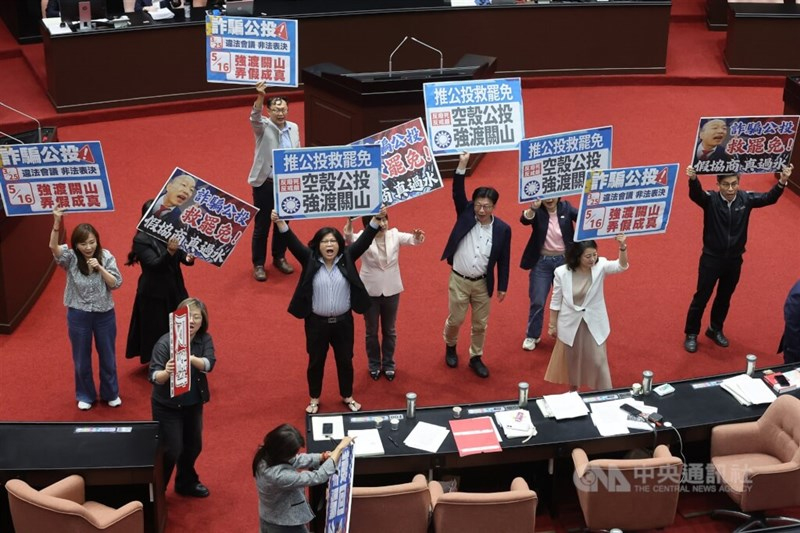On May 10, 2025, Taiwan’s Legislative Yuan passed a landmark opposition-backed referendum proposal aimed at countering what many see as a de facto abolition of the death penalty. The proposal passed by a narrow margin of 54-48 votes, thanks to a joint effort by the Kuomintang (KMT) and the Taiwan People’s Party (TPP), bypassing standard committee-stage deliberations and setting the stage for a national referendum on August 23, 2025.
While Taiwan’s ruling Democratic Progressive Party (DPP) maintains that it has not officially abolished capital punishment, the issue has become a political flashpoint. Public anxiety about rising crime and mistrust in the judicial process has added fuel to the debate. The Constitutional Court’s 2024 ruling, which imposed a requirement for unanimous judicial agreement in death penalty cases, significantly restricted its actual use — prompting critics to argue that capital punishment now exists only “in name.”
📌 The Referendum Question
The referendum will ask:
“Do you agree that judges in a collegiate panel at all levels of courts do not need unanimous agreement to sentence a defendant to the death penalty?”
This question strikes at the heart of the 2024 Constitutional Court ruling, which found capital punishment to be constitutional but demanded strict judicial consensus to ensure human rights protections.
🔍 Political Context: More Than Capital Punishment
The referendum is not merely about legal process — it is embedded in Taiwan’s broader political power struggle. The KMT introduced this proposal along with another, set for vote next week, opposing martial law. Both moves come amid intensifying cross-party tensions, with recall campaigns targeting lawmakers on both sides.
KMT Chairman Eric Chu linked the martial law referendum to President Lai Ching-te’s recent national security measures, which the opposition fears could erode civil liberties and escalate tensions with China.
Premier Cho Jung-tai of the DPP dismissed both referendums as “chasing ghosts in the dark,” implying the issues are fabricated distractions with no real bearing on policy.
📈 Implications of the Vote
This is Taiwan’s first-ever legislature-initiated referendum since the Referendum Act was amended in 2017, removing the Central Election Commission’s authority to block proposals passed by lawmakers. The CEC is now required to schedule the vote, which will occur on August 23, the fourth Saturday of August in accordance with the law.
If the public votes in favor, it would politically challenge the Constitutional Court’s authority and embolden legislators to push for looser sentencing standards. However, a successful referendum does not automatically overturn court decisions, meaning any change to judicial practice may require further legislation or judicial review.
⚖️ Broader Legal and Social Debate
Capital punishment remains a deeply divisive issue in Taiwan, with polls suggesting a majority of citizens support the death penalty, especially in severe criminal cases. Yet human rights groups and legal scholars argue that Taiwan must align with global democratic norms, which increasingly reject capital punishment altogether.
This referendum revives old tensions between:
- Populist support for tough justice, and
- Institutional safeguards to prevent wrongful executions and uphold international human rights standards.
Legal experts warn that revising judicial standards via referendum may set a dangerous precedent, potentially undermining judicial independence.
📚 Historical and Global Context
Taiwan last executed a prisoner in 2020. Since then, no new death sentences have been carried out, and courts have grown increasingly reluctant to issue them due to evolving judicial interpretations.
Globally, Taiwan finds itself in a shrinking group of democratic nations that still retain capital punishment. In Asia, Japan and the U.S. also retain it, but within tightly regulated frameworks. Taiwan’s judiciary has attempted to follow suit by raising procedural thresholds, which are now being challenged through this referendum.
🗳️ What’s Next?
With the August 23 vote confirmed, both sides are expected to mount aggressive public campaigns. The KMT and TPP will likely position the vote as a stand for public safety and judicial freedom, while the DPP and civil rights groups will frame it as a threat to human rights and due process.
Voter turnout and mobilization will be crucial. Given the referendum’s binding nature, the outcome will have long-term legal and political implications, even if it doesn’t directly overturn existing laws.
❓FAQs
Is Taiwan abolishing the death penalty?
No. The death penalty remains legal in Taiwan. However, a 2024 Constitutional Court ruling made its application significantly more difficult.
What will the referendum change?
If passed, it will challenge the court-mandated requirement for unanimous agreement among judges to issue a death sentence, pushing for a more flexible sentencing process.
Is the referendum binding?
Yes, Taiwan’s referendums are binding. However, interpretation and implementation of results often require legislative or judicial follow-up.
Who supports the referendum?
Primarily the opposition parties — Kuomintang (KMT) and Taiwan People’s Party (TPP) — citing public safety and judicial freedom.
What does the ruling DPP say?
The DPP opposes the referendum, calling it unnecessary and politically motivated. They argue the death penalty has not been abolished, and that the issue is being exaggerated.


